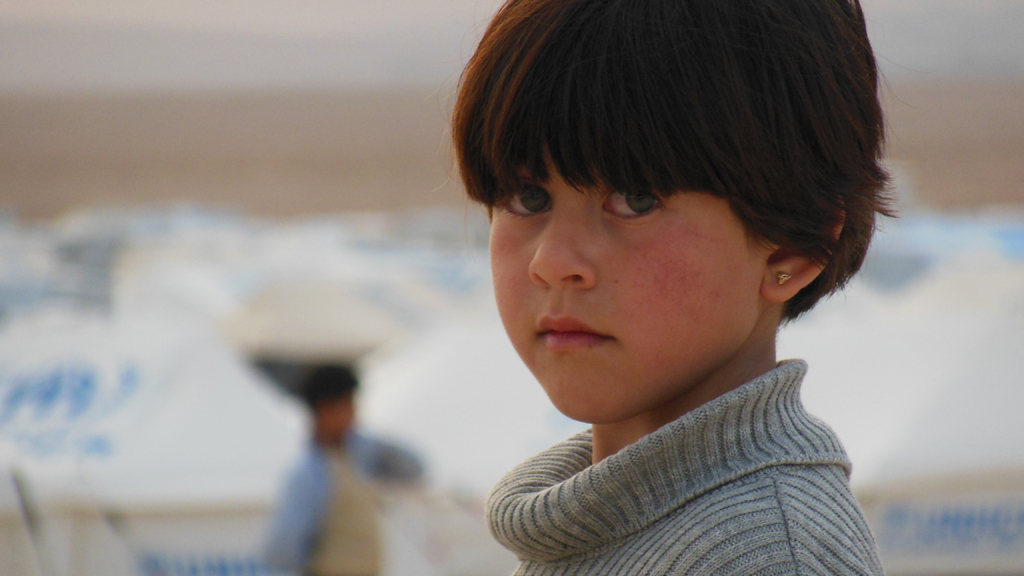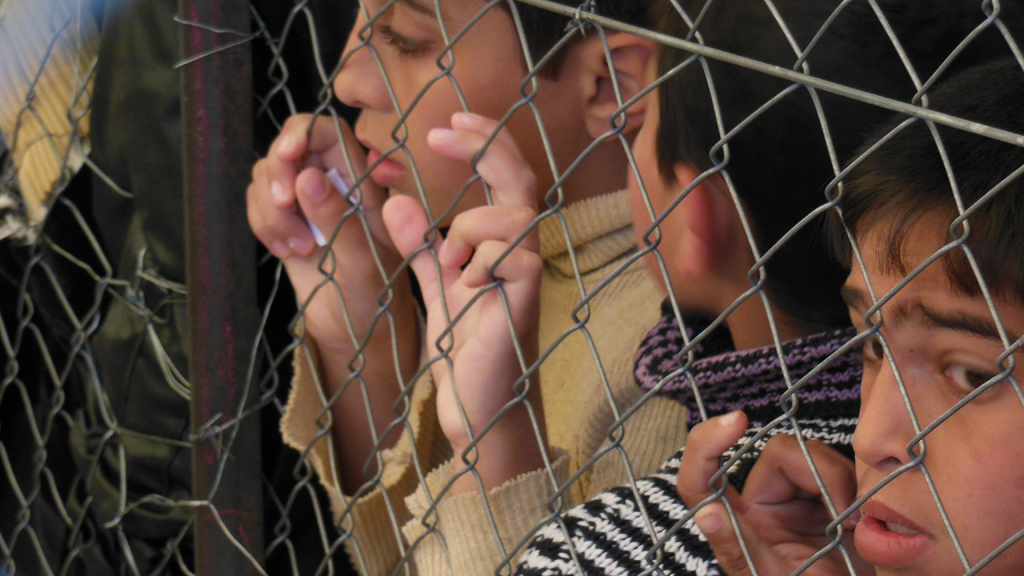Terror prompts ‘alarming’ rise in Syrian refugees to Jordan
As thousands of Syrian refugees cross the Jordanian border fleeing extreme violence and bombing, Jordan’s foreign minister tells Channel 4 News there is a lack of funds to cope with the influx.
Syrian refugees are crossing into northern Jordan in unprecedented numbers – the surge ascribed to a dramatic spike in violence in and around the southern city of Dara’a, writes Channel 4 News Foreign Affairs Correspondent Jonathan Miller. Deeply traumatised new arrivals, disgorging from trucks and minibuses at a refugee camp close to the border, told of the terror they had experienced – as recently as last night – at the hands of the Syrian regime.
“It’s unreal,” Jordan’s Foreign Minister Nasser Judeh, told Channel 4 News. He promised his country would keep its frontier with Syria open, describing it as “Jordan’s duty” to assist the Syrian people. But the country is in danger of being overwhelmed by the influx which shows no sign of slowing.

For more than a week now, Syrian refugees have been flooding in at the rate of 3,000 a night, according to the Jordanian armed forces, which says 52,500 have crossed in January alone – a record number. Two million people are estimated to have been displaced within Syria; the total number of refugees in Jordan, Lebanon and Turkey is approaching 700,000.
We have 340,000 Syrians in a population of six million. Can you imagine the equivalent in Britain? It would be like having millions of people arriving on the shores of the UK. Jordan’s Foreign Minister Nasser Judeh
Most of the new arrivals are taken to Jordan’s Za’atari refugee camp, five miles from the border, and close to Dara’a, where the uprising against Bashar al-Assad began in March 2011. The city has faced intermittent siege and bombardment from Syrian government forces. But refugees all report a serious intensification in the fighting in recent days.
Channel 4 News has witnessed hundreds of Syrians pouring into the camp early on Tuesday morning – many of them single mothers and children, who had crossed under cover of darkness, with the help of fighters from the rebel Free Syrian Army. The refugees were smuggled along backroads from Dara’a to the border, where they were delivered into the hands of Jordanian soldiers.

‘It feels like war’
All the refugees talk of the extreme violence meted out on them by Syrian government forces and their allied sectarian militias. They accuse the regime of bombing, burning and destroying their homes, raping women and killing men. The new arrivals described the escape into Jordan of entire neighbourhoods, who ran away en masse.
Ahmad, who is from Dara’a – and who did not wish to reveal his full identity because other members of his family remain in the city – said that for civilians, life there had become intolerable and unsustainable. “They are destroying all our houses and killing all the people. There is no electricity, no food. There are no jobs.” he said. “I left with my mother and sisters because of the bombing.”
The Tuesday edition of the Jordan Times quotes a security source stationed near the frontier: “It doesn’t feel like a humanitarian crisis. It feels like war.” The source told the newspaper that Syrian refugees were being transported from the border to Za’atari every half hour and that some were dying on the border.
The faces of new arrivals are weary and drawn. Some are in a state of great agitation and indignation over their treatment at the hands of their own government. There is also great forbearance and acknowledgement that the situation in Za’atari camp is better than that back over the border in Dara’a. The prospect of riding out the winter under canvas is more palatable than risking going home.
More funding needed
But the camp, now spread out over nearly three square miles of desert, is chronically underfunded. The United Nations needs $500m just to keep it going until June.
We saw thousands of people stand patiently in a huge queue, waiting for handouts of Arab flatbread from the United Nations’ world food programme. Aid workers say a quarter of a million individual loaves are now being distributed daily. The refugees are also provided with dry food rations and other cooking essentials. There are now estimated to be more than 65,000 refugees in the camp, although the Jordanian government says the country is now hosting five times that number, with many living with relatives in Jordan.
“It’s alarming,” Mr Judeh told Channel 4 News, as he prepared to fly with King Abdullah II to Kuwait for a crisis donors’ meeting. “We have 340,000 Syrians in a population of six million. Can you imagine the equivalent in Britain? It would be like having millions of people arriving on the shores of the UK.”
They are invading our houses and attacking women. First they cut the electricity and then they enter the houses. Dana Salamat, Syrian refugee in Jordan
Jordan already hosts the biggest Palestinian refugee population in the world, estimated to make up around a third of its population. Within the past decade, the country also provided sanctuary to up to half a million Iraqis. Now it’s Syrians.
“We want help so that we can continue to welcome Syrians seeking a safe haven,” said Mr Judeh. “A lot of help has come through but a lot more is needed given the alarming increase in numbers.”
The foreign minister said the crisis was putting strain on Jordan’s health, education, energy and water resources. “We are either drained or extremely challenged,” he said. “Such is Jordan’s predicament. But such is Jordan’s duty as well. We have undertaken to keep borders open to Syrians given the harsh realities for them on ground.”

A woman in the bread queue, whose name is Dana Salamat, said her five-year-old son was very sick. A toddler clung closely to her as she waited to collect her rations. “I left Dara’a two days ago because of the bombing,” she said. “They are invading our houses and attacking women. First they cut the electricity and then they enter the houses.”
One night she heard other women screaming “the army is here, the army is here,” and calling for help Sexual violence directed at women by regime forces has been widely documented.
There are many widows among the refugees as well as women whose husbands, brothers and fathers are now fighting with the rebel Free Syrian Army. We encountered an elderly blind man among this morning’s arrivals. He said his two sons had been killed when the family home was attacked and that he’d escaped overnight with the help of surviving relatives.
Arabs ‘are doing nothing’
Another man, whose name is Fadi, but who also did not want to reveal his identity, held up his six-year-old daughter, Samar. The girl bore a large and prominent purple scar on her upper left leg, which her father said had happened when their home was bombed. He fled because he said he was no longer able to find medical treatment for Samar.
Remarkably, he appealed to Israel for help. We thought we had misheard him at first. “I call upon Israel to help us,” he said. “I am not calling the Arabs because they are doing nothing.” It is a measure of the desperation of the refugees that they should resort to such rhetoric, as many Syrians harbour deep antipathy towards Israel.
More than half of all those arriving at Za’atari are children; more than 30,000 have now been registered there. Mohamad al Asmar, a representative of Save the Children, said:
“The challenge for us is instilling a sense of hope in these children, providing a sense of normality and helping children who have been exposed to the trauma of violence and displacement to cope.”
Many of the children do not have adequate clothing or footwear for the cold, wet weather.
All the refugees which Channel 4 News spoke to on Tuesday said rebel soldiers from the Free Syrian Army had helped smuggle them across the border. It appears to be a highly organised process.
We met several men who openly claimed to be FSA members in Za’atari Camp. The fighters were not carrying their weapons, but admitted to crossing back and forth into Syria every few days, to engage regime forces. Aid agency workers at the camp say they are well-aware of the FSA presence there.
-
Latest news
-
Boy with profound learning disabilities reaches out of court settlement after abuse in residential school7m

-
India election: Modi rivals hit by string of raids and arrests7m

-
Can UK’s abandoned mines be used to build a greener future?5m

-
Sycamore Gap: Man pleads not guilty to felling iconic tree2m

-
‘Child poverty has not fallen since Tories came in’, says Gordon Brown5m

-




